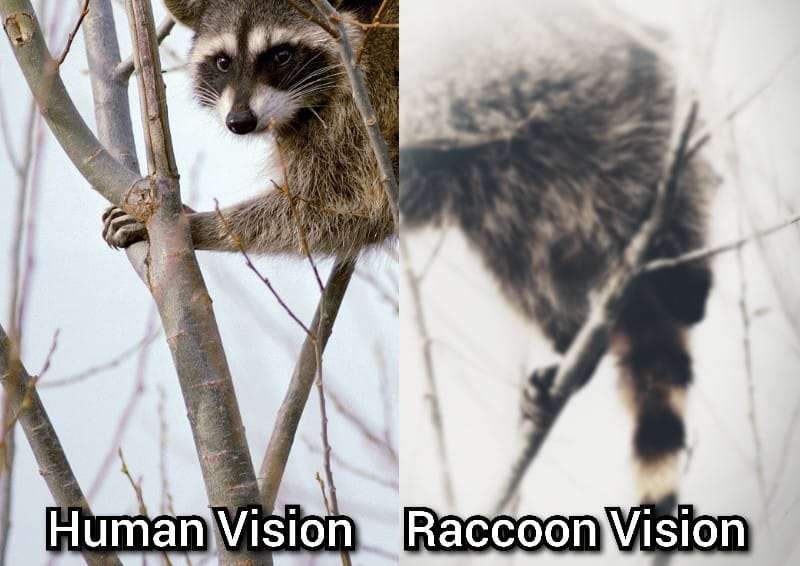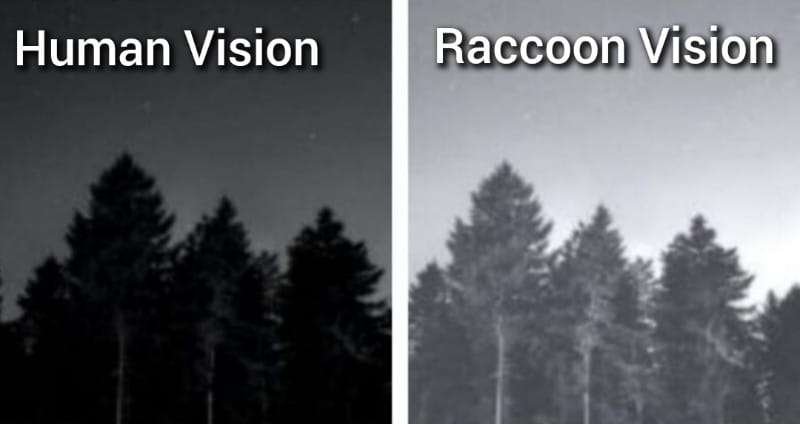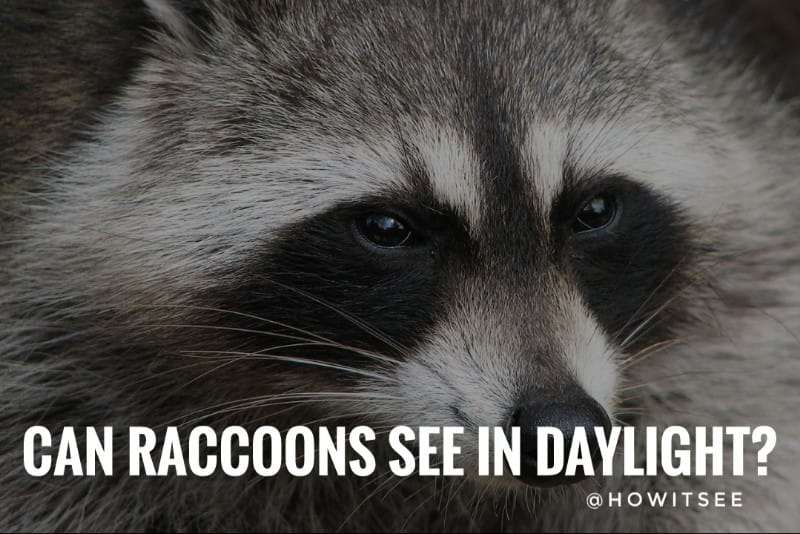Raccoons are the largest mammals of the procyonid family that are native to North America. Everyone comprehends that Raccoons are nocturnal, but many of us see them wandering even in the daylight. So, have you ever wondered if can Raccoons see in daylight, or are their vision only limited to night?
The answer to this question is: Yes, Raccoons can see very well in daylight. They have poor long-distance vision; that’s why they always try to avoid open spaces, especially during the daytime when the sunlight makes distant vision blur. However, they can visually discern nearby objects during the day.
At night, raccoons are mostly active as they are nocturnal. They have a reflective membrane in their eyes called tapetum lucidum that allows them to see their surroundings in low-light conditions.
Sight plays a secondary role in raccoons’ life. They are highly sensitive to hearing and touch, which helps them to distinguish things and surroundings. Later in this post, we have explained more about Raccoons’ vision and can & how they see in daylight and at night. So, let’s discuss.
Note: It is mentioned on many sites that precaution is needed when you see a raccoon walking out in the daytime as it may have rabies.
Can Raccoons see in Daylight?
Raccoons can easily see in daylight, but their vision is not similar to ours. They are not completely colorblind and have a limited ability to distinguish colors.
According to recent research, it is estimated that raccoons can easily sense green light. Therefore, many scientists recently categorized raccoons as low color perceiving ability animals rather than completely colorblind.
Raccoons have blur vision. They cannot see with proper details in daylight like humans. They also have low-graded long-distance vision, which is why they love navigating compact areas.
In a nutshell, raccoons see the shapes & sizes of their surrounding entities in less color, and from touch and smell, they identify the entity properly. Below we have attached an image of how raccoons see in daylight.

Apart from eyes, raccoons have an excellent sense of smell, hearing ability, and a sensitive sense of touch. Over the years, they have developed nerves in their forepaw pads that support them in identifying items.
They are nocturnal, which means, like other nocturnal animals, they have a heightened sense of smell and hearing so that they don’t have to depend on their vision in the dense forest where there is complete darkness.
Therefore, over time, they have lost their ability to perceive colors because it doesn’t play a significant role in their life.
Raccoons’ eyes have more rods than cones. Rods in the eyes help to glimpse the environment in low light conditions, whereas cones help to differentiate millions of color shades. Humans’ eyesight is more concentrated toward cones, whereas raccoons are the opposite.
Having too many rods in the eyes helps them easily navigate in the dark under the moonlight. But it doesn’t help in daylight conditions.
That’s why they are primarily inactive during the day. But sometimes due to a shortage of food or some other reasons, they have to adjust their eyes and wander in the daytime. At this time, they are partially blind and mostly rely on their other senses.
Do Raccoons Have Good Eyesight?
Raccoons have good night eyesight as compared to humans, but in the daytime, humans have superiority over vision. Raccoons are nocturnal, meaning their eyesight is an advantage during low-light conditions.
As mentioned earlier, their vision is concentrated more on rods allowing them to witness in the dark. Therefore, here we can say that raccoons have good eyesight at night.
During the daytime, cones have an advantage over rods in distinguishing multiple hues. Unlike many diurnal animals, raccoons are estimated to have only one kind of cone that allows them to see mostly black and white shades.
But if we compare raccoons’ eyes with similar animals, we can guess that they may be dichromatic in nature. It means there is a probability that raccoons are to distinguish yellow, and gray shades. However, no confirmed research has been done on raccoons yet.
Can Raccoons see in the Dark? Raccoons Night Vision
Raccoons have good night vision and can easily see in the dark. They are nocturnal and carry out their daily activities mostly at night. Therefore, their eyes evolved with more rods that enhance their capability to see in the dark.
In addition, raccoons have tapetum lucidum, a thin reflective tissue in their eyes that reflects even the slightest of light entering in eyes directly to the retina.
With the help of rods and tapetum lucidum, raccoons see the world with more brightness at night as compared to humans. Below we have inserted an image that displays the difference in the vision between humans and raccoons in the dark.

Unlike raccoons, we don’t have any ability to discern at night. Our eyes can adjust in the darkness, but it mostly identifies the shape of the object in low-light conditions.
On the other hand, raccoons can also see minor details of an entity along with its shape and size in the dark.
Furthermore, they use their secondary sense to distinguish the object, i.e., touch. They usually touch everything, and the nerves in their pads assist them in recognizing these particular entities.
What colors do Raccoons see?
Raccoons are considered to be colorblind, but they are not completely colorblind. They have limited color vision.
However, it is not officially researched, but many peoples claim that they are dichromatic like other nocturnal animals. It is an estimation that raccoons predominately see the world in yellow and gray shades.
Raccoon Vision vs. Human Vision
| Raccoon Vision | Human Vision |
| Raccoons have blur vision during the daytime. | Humans have sharp vision during the daytime. |
| They are considered to be colorblind or at least poorly able to distinguish colors. | We can recognize millions of color shades. |
| Raccoons have good night vision. | Humans do not have night vision |
| They have poor long-distance vision. | We have excellent long-distance vision. |
Raccoons possess remarkable visual adaptations that enable them to see in both daylight and at night.
While they are primarily nocturnal animals, they also exhibit crepuscular activity, meaning they are active during dawn and dusk. Raccoons have a combination of features that contribute to their visual capabilities.
Their eyes are well-adapted to low-light conditions, with a higher number of rod cells that enhance their sensitivity to dim light.
Additionally, they possess a reflective layer in their eyes called the tapetum lucidum, which enhances their night vision by reflecting light back through the retina.
During the daytime, raccoons rely on their keen eyesight to detect and locate food sources, navigate their surroundings, and identify potential threats. They are also known to have excellent visual memory, which aids in finding and remembering food locations.
Overall, raccoons possess a versatile visual system that allows them to thrive in various lighting conditions, making them highly adaptable and successful in their natural habitats.
Here, we have concluded our article on “Can Raccoons See in Daylight & at Night,” and explain more about raccoons’ vision. We hope you like it. We will be back with another post. Till then, stay tuned with us and read the articles below.
Also Read:

Meet Abhidept (nickname Monty), the visionary founder of How It See, being an engineering student, he’s fueled by an insatiable curiosity about the world around him. He is captivated by an eclectic correlation between animal groups, science, and nature, and this fascination drives his quest for understanding.
After completing his degree, he’s set on a mission to delve deep into the realm of nature, accumulating knowledge to share with you through his writing. In the meantime, he loves to watch anime and read anime.
